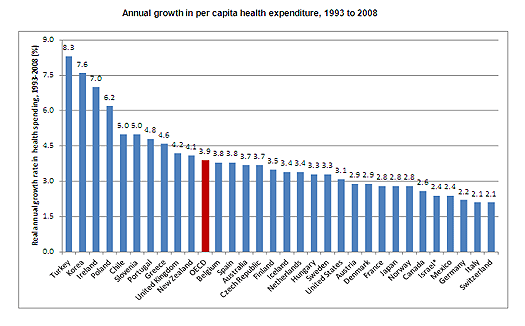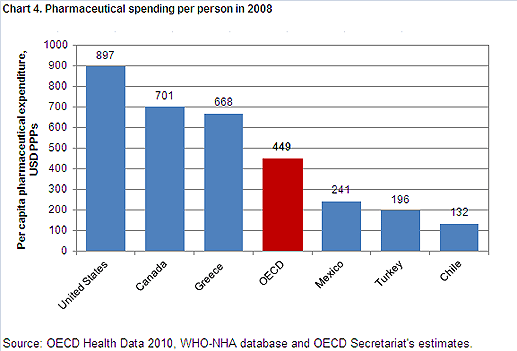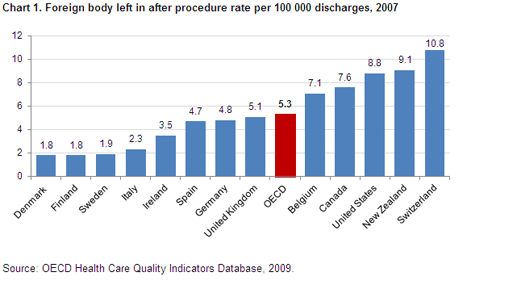Progress in healthcare by OECD countries over the past 50 years has been nothing short of remarkable. Life expectancy, for example, has increased by 10 years since 1960. People born today can expect to march on with vigour to their 80th year. But living longer comes at a price. There has already been considerable debate about how to fund future pensions; the questions healthcare raises must be given similar attention.
Although this crisis should not be allowed to erode our hard-won achievements, nor diminish people’s attachment to the availability of good healthcare, it does provide us with an opportunity to take a good hard look at what changes are required in order to get the best value for the resources we spend on healthcare.
Before the crisis, health spending on a per capita basis was rising some two to three times faster than the rest of the economy. In the past 10 years, health expenditures in the OECD have increased by 50% in real terms. In seven OECD countries they account for more than 10% of the economy.

Health systems, from running hospitals to paying for treatments, make up a significant proportion of public budgets, and they will inevitably take a greater share of public–and household–budgets in the future, as people will understandably demand more and better care, not less.
What areas of action should policymakers focus on to make health more affordable and effective in addressing present and future challenges?
The clear lesson emerging from our work at the OECD is that value for money in healthcare can be improved, though a key challenge is to marshal the pressures that drive costs today. These include ageing-related demands and treatments, and costly technology in areas such as pharmaceutics (chart 4) and diagnostics.

There are modern conditions, too, which are pushing up healthcare costs, such as those caused by obesity. And there are the structure and organisation of the health systems themselves, which may require timely reforms.
Some policy remedies to tackle costs, such as encouraging wider use of generic drugs instead of more expensive branded ones, or improving access to basic care and outpatient services to reduce pressure on hospitals, may be relatively straightforward to enact.
Other measures, from reforming cost structures and reorganising management, to equipping and better applying information technology, may be more complex. Strategies may be needed to build better coherence and knowledge-sharing across often-fragmented health departments, in order to reduce delays, avoid duplication and reduce risks to patients.
But two fronts stand out which, if tackled, would bear near-certain fruit. First, quality could be improved: evidence shows that better services lead to shorter treatments and healthier outcomes. Policy should shift the emphasis from volume to quality, by realigning pay incentives for hospitals, doctors and nurses, for instance. Better quality can also save money by avoiding unnecessary procedures, not to mention some costly mistakes (chart 1). The Institute of Medicine in the US once estimated that medical error kills more people than traffic accidents.

Secondly, greater emphasis must be placed on prevention. Obesity provides a good example. In 1980, one person in ten was obese across the OECD. Today, in half of the OECD countries, every second person is obese or overweight. Some developing countries also have to grapple with this challenge, adding to their already considerable health woes. The result has been a sharp rise in chronic conditions that are costly to treat, from cardiac disease and stroke to diabetes and some cancers. In fact, obesity reduces life expectancy as much as smoking does.
New technologies and drugs can help, but these cost money without properly tackling the root of the problem. Only prevention can effectively treat some of the causes, such as poor diet and inadequate exercise. Urgent action is needed. Parallels can be drawn with the economic crisis, which we continue to pay for dearly because of our collective failure to identify and deal with the causes. Obesity is a warning sign, and we cannot claim ignorance.
Last but not least, policymakers should resist cutting spending on prevention. It may take years for prevention programmes to show results, but as with anti-smoking campaigns, they are cost-effective and produce results thanks to healthier lifestyles.
Although the economic crisis puts policymakers under great pressure, safeguarding and improving healthcare is vital for long-term growth. With the right approaches, we can produce improvements and savings as well. The public, as well as Hippocrates, would approve."





